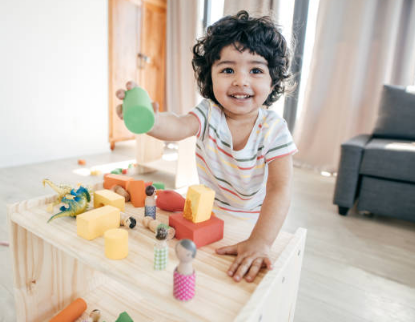“Sharing is caring!” We hear this all the time. It is written on a poster in the school hallway. Here’s what your child’s favorite TV character says.
But now, your child is screaming,”Mine!” You might say,”No, no, please share.” We interjected,”No, no, wait!” Why? Because: Young children don’t know what it means to share. They can’t grasp what they can’t understand. Therefore, taking care of our young children means not asking them to share. At least not yet.

Toddlers & Sharing
Shouldn’t we be advocating sharing? Of course…That’s exactly what you’re doing, waiting until your child is mentally and emotionally ready to see sharing as a gesture of care rather than “ahhhhhhh
We don’t expect a 6-month-old to walk like a 12-month-old, or a 1-year-old to “speak your language” like a 2-year-old, but from the moment they can speak, we start grabbing another toddler’s cardboard book and we start telling them to share. We are fooled by the speech and toddlers of young children – and the agendas they emphasize—— making us think they understand themselves more deeply in the world than they do now. At this stage, concepts like sharing are simply beyond their capabilities.
Why Toddlers Aren’t Ready to Share
Young children are not yet sure that they are individuals. They’re testing the idea — building self-awareness — in large part by achieving a sense of ownership:”I have, therefore I am.” They are not selfish when they hold on and stick to it for the sake of their dear life and need everything for themselves – they are scientists and are testing the hypothesis that they are individuals. The world is their laboratory,”it’s all mine!” This is one of the experiments they are doing.
To complicate matters further, they don’t yet understand that things can belong to other people, not just themselves!
Then, there is the concept of time – young children do not yet have the concept of time. Therefore, for them, giving up anything means giving up forever. Even structured turn-overs (“wait one more minute, and then it’s your turn”) can be a huge nuisance for people who don’t have a sense of time. Sharing, even less clearly defined in time, is practically impossible.
Then we came to…Impulse control. To illustrate this, look at the infamous toddler’s credo:”If I want it, it’s mine! If I used it yesterday, it’s mine! If I can take it out of your hands, it’s mine!” They want what they want when they want it — plus another child, some toys, and an adult talking about “sharing,” and there’s a flammable situation in your child’s lab.

But, you might say, my kids were happy to give me cereal and hand me toys while we were playing – wasn’t that sharing? Well, well, that’s part of the self-science experiment we mentioned above. When this happens, you can acknowledge the gesture and then perhaps show gratitude by sharing sincerely, and if your child hasn’t regained it yet, early childhood scientists will spend the next year diligently Xi this social/emotional skill, or as such, until brain development, socialization, and the desire for friends open the way to truly sharing.
But until they’re ready (around three years old), trying to share can actually backfire. No one likes things to be taken away, especially when they don’t understand why. “Sharing” will become a bad word,”sharing” some behaviors that need to be avoided, so (as child development experts point out) “selfishness” will last longer.
How to Develop Children’s Sharing Skills
What to do before toddlers know how to share?
- Label and validate the mood of the moment. If someone’s toy is taken away, say,”When JoJo took your toy, you didn’t like it” because feeling understood calms you down. Then say,”Next time, hold on” because it’s their right to hold on to what they need. Suggest to the scraper,”Next time, ask,’Can I use it?'” You may find yourself using these phrases a lot over time…These simple interpersonal lessons take time to digest.
- Share the model for your child. Young children expect us to explain their world. Show that you like to share and they will want to “get there” too.
Don’t worry, be patient – it won’t be long before your child understands that “sharing is caring”. Think about “self” instead of “selfishness,” set an example of generosity, and let them stick with it for a while. If you give them time, they’ll be more willing to let go and share their stuff when they’re ready!

